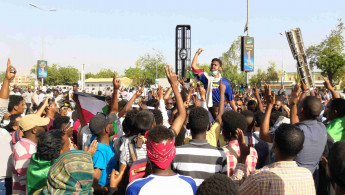Sudan protesters, military council say talks 'fruitful'
Organisers of the protests that drove Sudan's President Omar al-Bashir from power and the ruling military council said talks Saturday on forming a transitional government were "transparent" and "fruitful."
Both sides announced they would set up a joint committee comprised of members of both the military council and the Forces for the Declaration of Freedom and Change, a coalition of opposition groups led by the Sudanese Professionals Association, to tackle political disputes.
Saturday's meeting came after the protesters agreed Wednesday to resume talks with the military after a temporary break.
The military also announced then the resignation of three members of the military council, whom the opposition had accused of being too close to al-Bashir.
But the Sudanese Communist Party, which is part of the protest movement, called late Friday for a fourth member of the council, deputy head Mohamed Hamdan Dagalo - commonly known by his nickname Hemedti - to step down.
Hemedti is commander of the paramilitary Rapid Support Forces, which have been accused of genocide in the Darfur region.
The protesters fear the army, dominated by al-Bashir appointees, will cling to power or select one of its own to succeed him. They also fear Islamists and other factions close to the deposed leader, who is now jailed in the capital, Khartoum, will be granted a role in the transition.
Twitter Post
|
Shams al-Deen al-Kabashi, the spokesman for the military council, said the talks were "transparent" and that both sides agreed on resuming their meeting later Saturday.
"We are very optimistic that we will reach a final conclusion that will be announced to the Sudanese people as soon as possible," he told a brief press conference.
A member of the protesters' team said the talks were "fruitful" and that they have discussed "all disputed points."
"The discussion was positive and fruitful," activist Madani Abbas Madani said.
The Sudanese Professionals Association, which spearheaded four months of escalating demonstrations that led the military to remove al-Bashir from power on April 11, is demanding a civilian government.
They have proposed that a sovereign council, which would include "limited" army representation, hand over full powers to civilians during a four-year transitional period.
Army leaders have called for a two-year transition during which the generals would retain sovereign power and give only executive authorities to civilians.
The military has agreed to recognize the Forces for the Declaration of Freedom and Change, a coalition of opposition groups led by the SPA, as the uprising’s only legitimate representative, in a move widely seen as a victory for the protesters.
Gen. Abdel-Fattah Burhan, head of the military council, said Saturday in televised comments that the FDFC was the leading group behind the uprising, but the consultations are open to all parties except al-Bashir's National Congress party.
The council has met with a wide range of political parties about the transition, including those formerly close to al-Bashir. Al-Kabashi, the spokesman for the council, said late Friday that it had completed a review of proposals. He did not elaborate.
The opposition has meanwhile vowed to continue protests, centred on a sit-in outside the military headquarters in Khartoum.
Former Prime Minister Sadiq al-Mahdi, the leader of the opposition Umma party said the protesters will not break up the sit-in until there is a full transfer of power to civilians.
The SPA says around 100 people have been killed by security forces since December, when a failing economy and a spike in prices sparked the first protests.
Meanwhile, a group of protesters arrived Saturday outside a meeting of the Popular Congress party in Khartoum.
Video footage circulated online showed dozens of demonstrators outside a building where the meeting apparently took place, shouting "no place for the Islamists."
Local reports said the protesters prevented the meeting from taking place and there were clashes that led to some injuries.
The SPA condemned demonstration.
The Popular Congress party was established in the late 1990s by Hassan al-Turabi, the Sudanese Islamist who played a key role in the 1989 military coup that brought al-Bashir to power and who once hosted late al-Qaeda leader Osama bin Laden and his deputy Ayman al-Zawahri in Sudan.





 Follow the Middle East's top stories in English at The New Arab on Google News
Follow the Middle East's top stories in English at The New Arab on Google News
![22 Arab countries at COP29 have rejected the targeting of fossil fuels [Getty]](/sites/default/files/styles/image_330x185/public/2024-11/GettyImages-2184289638.jpg?h=199d8c1f&itok=ptHl5bec)
![Dozens of people turned out for the funerals [Getty]](/sites/default/files/styles/image_330x185/public/2024-11/GettyImages-2185229760.jpg?h=e7c891e8&itok=1bctDcE6)
![The UAE is widely suspected of arming the RSF militia [Getty]](/sites/default/files/styles/image_330x185/public/2024-11/GettyImages-472529908.jpg?h=69f2b9d0&itok=Yauw3YTG)